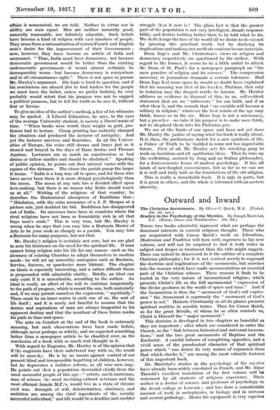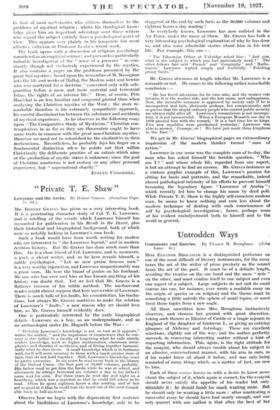Outward and Inward
THESE two books admirably represent what are perhaps the dominant interests in current religious thought. Those who are acquainted with Canon Quick's work on Liberalism, Modernism and Tradition will turn with eagerness to his new
volume, and will not be surprised to find it both wider in subject and deeper in treatment than the title might suggest. There can indeed'be discovered in it the outline of a complete Christian philosophy ; for it is not content merely to expound the doctrine and implications of the sacraments, but searches into the reasons which have made sacramentalism an essential part of the Christian scheme. These reasons it finds to be rooted in the very nature of incarnational religion ; which presents Christ's life as the full sacramental " expression of the divine goodness in the world of space and time." And if the Incarnation is thus the " sacrament of God's self expres- sion " the Atonement is supremely the " sacrament of God's power in act." Historic Christianity in all its phases presents spiritual realities in sensible terms. Thus for Canon Quick, as for the great Berulle, of whom he so often reminds us, Christ is Himself the " major sacrament."
This doctrine is developed in two chapters as beautiful as they are important ; after which are considered in order the Church, as the " link between historical and universal incarna- tions," and the two great sacraments of Baptism and the Eucharist. A careful balance of completing opposites, and a vivid sense of the paradoxical character of that spiritual power which " can derive its very means of expansion from that which checks it," are among the most valuable features of this important book.
Dr. Marechal's studies in the psychology of the mystics have already been widely circulated in French, and Mr. Alger
Thorold's excellent translation of the first volume will be welcomed by all students of religious experience. Their
author is a doctor of science, and professor of psychology in the Jesuit college at Louvain ; and has done a considerable amount of work in metaphysics, in biology and in nervous and mental pathology. Renee his equipment is very superior to that of most ecclesiastics who address themselves to the problems of mystical religion ; whilst his theological know, ledge gives him an important advantage over those writers who regard the subject entirely from a psychological point of view. This appears very plainly in his temperate but most effective criticism of Professor Leuba's recent work.
The book opens with a discussion of religious psychology considered as an empirical science ; and goes on to a particularly valuable investigation of the " sense of a presence " so con- stantly though not exclusively experienced by the mystics, It also contains a paper on the problems presented by the great Sufi mystics ; based upon the researches of M. Massignon into the life and works of Hallaj, the Moslem saint and heretic who was martyred for a doctrine " concerned only with safe- guarding before a more and more material and terrestrial Islam, the rights of an interior life." Here, of course, Pere Marrehal is on less familiar and congenial ground than when analysing the Christian mystics of the West ; the more re- markable therefore is his extremely sympathetic approach, his careful discrimination between the substance and accidents of mystical experience. As he observes in the following essay upon "The Comparative Study of Mysticism," Christian eon- templatives in so far as they are theocentric ought to have some traits in common with the great non-Christian mystics : therefore we need not be astonished by the similarities in their declarations. Nevertheless, he probably lays his finger on a fundamental distinction whm he points out that within Christianity the deliberate practice of an askesis which aims at the production of mystic states is unknown ; since the goal of Christian asceticism is not ecstasy or any other personal experience, but " supernatural charity."
EVELYN UNDERHILL.















































 Previous page
Previous page